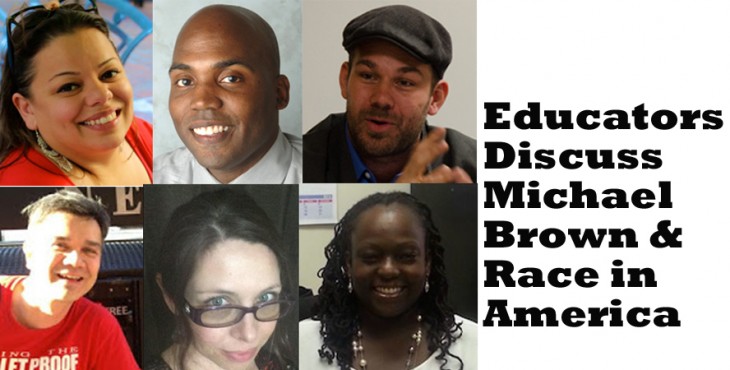By Xian Barrett.
1. In terms of a response to the Michael Brown shooting, what is our responsibility as educators and citizens who care about social justice?
We must acknowledge the fact that if our students feel as if we don’t care if they live or die, there is literally no way we can engage them in an academic or any human way. It is our responsibility to weave the study of the inequities shown in the Michael Brown shooting (and in the every day criminalization of youth of color) into all of our disciplines and support students as they search for the power within themselves ot combat this injustice.
2. What are some productive ways to initiate and engage in dialogue with others on issues of racism?
I think the most productive way is to hear their thoughts and affirm them, while enforcing space for your own experience too. It does little good to tell people bluntly that they are racists or their world view is wrong. At the same time, we can say, “Our experiences are also worthwhile and yours doesn’t nullify ours”. Often in classes, I’ll have students first share in a group activity where they can passively share their experiences and then move into personal histories. It’s harder to marginalize people’s daily reality than a political point.
3. What are some pitfalls to avoid?
I think it’s important to avoid focusing on the most extreme person in the room. Sometimes I’m tempted to focus on the one white dude in the room who insists that “WM are the oppressed party these days”. But if you constantly engage that guy, you end up replicating the unequal voice that society grants them. Instead, saying, “Thanks for sharing your experience. Let’s hear from other folks now”. Then it focuses people on equal voice.
4. Where can these dialogues lead us?
I think it’s not just where it leads us, but that it’s an important part of any justice movement. We can’t “focus on key issues” and hope racial justice comes along later. I think these conversations are how we confront the institutional inequities replicated into our own movements from their pervasive role in our society. They lead us to understand ourselves, each other and our movement for justice better and in the only way we can ever hope to win.
Xian Barrett is the Vice President of Engagement of New Voices Strategies. In 2009 he was chosen Teaching Ambassador Fellow by the Department of Education. In Chicago, Barrett founded a citywide youth-led social justice organization, brought students to New Orleans for service learning and organized sister-city events with Japanese schools. His philosophy of teaching is, “before the students lose interest in your instruction, ask them what they are passionate about and work with that—their learning belongs to them.”






szemelman
Thanks to all the thoughtful writers on this ongoing American challenge.
I’m finding that one of the most important steps for us as teachers is Xian Barrett’s concept of supporting “students as they search for the power within themselves to combat . . . injustice.” This is about not just kids’ discussion but also kids taking action. A book that has helped me most to think about this is Meira Levinson’s “No Citizen Left Behind.” As a teacher she often found that many students, including minority kids, had their own misconceptions about other groups — and that she had her own limited understandings as well. Important steps are to 1) help students listen to each other (Barrett’s “personal histories” is a good way to do this), 2) guide students to research issues that come up when they voice misconceptions, 3) lead students to research and pinpoint specific manifestations of injustice that they choose to address, and 4) implement action civics projects that show students they really can gain a voice and take action to improve conditions in their community. I’m seeing great teachers accomplish this in every subject area. Another wonderful book on this action approach is Brian Schultz’s “Extraordinary Things Happen Along the Way.”
–Steve Zemelman, Director, Illinois Writing Project